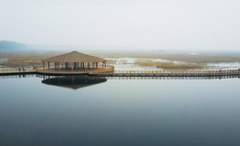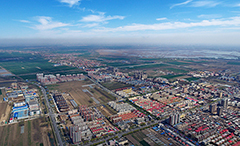Xiongan expected to see tourism boom
2017-04-11
China Daily
The planned Xiongan New Area in Hebei province is expected to bring tourism opportunities to a large wetland area and to the province as a whole, according to industry insiders.
The Communist Party of China Central Committee and the State Council announced a decision on April 1 to set up the new area to boost coordinated development of Beijing, Tianjin and Hebei.
Over the following three days-the Tomb Sweeping Day holiday-Baiyangdian received 18,000 tourists, with tourism income reaching 16.5 million yuan ($2.4 million). Both figures represented a 260 percent increase compared with last year, according to the tourism administration of Anxin county, which is part of the new area. Baiyangdian is one of North China’s largest freshwater wetlands.
Wang Xiaosong, chief executive of Lvmama, an online travel service provider, said he was not surprised by the surge.
“The new area has the basic infrastructure for attracting tourists-adequate tourism resources and transport,” Wang said. “The plan of the new area has attracted the attention of people all over the country and brought them here.”
Wang said bookings on Lvmama’s website for tourism products in the area during the holiday tripled those of last year, with tourists mainly coming from neighboring Beijing and Shandong province. But some people also came from farther afield, including Shanghai and the provinces of Jiangsu, Zhejiang and Guangdong.
Data from Ctrip, another online travel agency, was also encouraging.
“Monitoring is ongoing, and we estimate that people’s interest and bookings will continue to grow,” said Chen Xiaotian, director of Ctrip’s accommodation department.
Chen said the total GDP of a three-county area-20 billion yuan-is still small compared with Shenzhen’s Special Economic Zone and the Shanghai Pudong New Area, which means there is space and potential for the development of industries in Xiongan, including tourism.
However, Yu Yanan, lobby manager of a hotel near Baiyangdian, said all rooms were occupied on April 2 and most were booked the same day.
“April is not a busy season for Baiyangdian and I could tell most of our guests were not here for the purpose of tourism. Many asked us about buying property,” Yu said.
Zhang Guangrui, honorary director of the Chinese Academy of Social Sciences’ Tourism Research Center, warned that a sudden surge in local tourism statistics doesn’t necessarily equate to long-term sustainable growth.
The spike in tourist numbers during the holiday was not the result of tourist attractions, but of people’s curiosity about the new area, Zhang said.
“Local people must be cautious about this so-called opportunity, because tourists may come with high expectations of the place. If they are disappointed by the environment, facilities, services or anything else on their first visit, they may not want to come again.”


